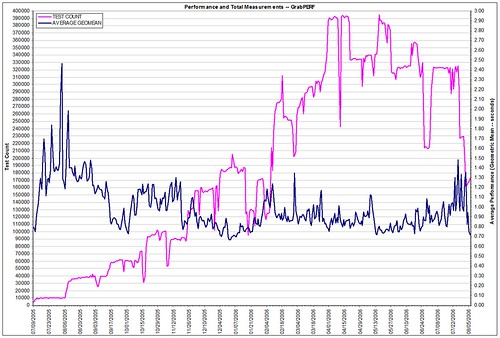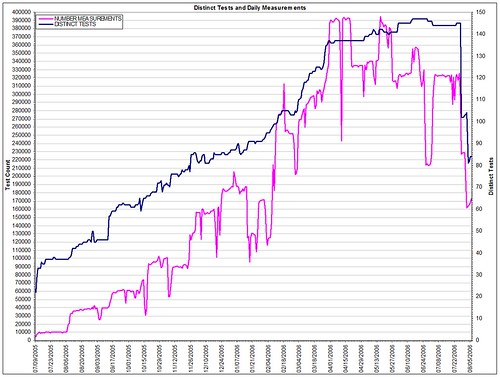July 25, 2006 at 19:48:24 GMT.
That’s the last time that the Technorati bot indexed my blog.
I am confused, because of all the sites out there, my blog should be pretty easy for Technorati to index — this server, as well as the GrabPERF servers is hosted in Technorati’s racks. Theoretically, the bot should be able to index my blog without leaving the building.
I posted something this morning, and IceRocket, Google Blogsearch, Ask.com Blog Search all have it.
I am wondering if anyone else is noticing this.
Technorati Tags: Technorati, Tags, Indexing, bots, search, blog+search
Author: spierzchala
Moleskine: Made in China

It was to be expected. On Moleskinerie there was a post that highlighted that the latest Moleskines are “Made in China”. The response from the Moleskine fan community has been overwhelming: we want the old books back.
China is responsible for a large number of the consumer products that we use today. However, there is an expectation that Moleskines were better than a mass-produced throwaway consumable. I imagine we all had images of a workshop filled with dedicated craftsmen, carefully hand-binding each notebook with absolute focus and attention to detail.
Sorry folks: these books have always been mass-produced. What is irksome even to me is that Modo e Modo (or their new French corporate masters) is no longer making a pretense of selling a quality journal that is unique and worth posessing. An item that sets the owner apart as someone who takes their notes, sketches and writings seriously, as thoughts worth dedicating to a medium that will last beyond them.
It’s all about brand. And the Moleskine notebooks are the icon of the social networking brand growth vision held by so many companies today. The core, dedicated following evangelizes the product, drawing more people to try the product and love it. As with so many things, will popularity denude and degrade the product?
If it is true that the latest production runs of Moleskines are originating in China and are of a lower quality than the community has come to expect, nay, demand, of this fine piece of crafting, then the no longer have the cachet, and are no longer unique, and will die the death of a million blog posts.

I am voting for the Rite in the Rain notebooks to be the next iconoclastic notebook. The unique yellow covers and indestructible paper have made me think twice about this addiction to Moleskines. They are books designed to be noticed (try finding a black notebook in the woods after it’s fallen out of your pack!), and stand out in a coffee shop, especially one filled with darkly dressed artist types.
Moleskine, I am willing to give you a chance. The community wants to hear your answer.
Oh, and Rite in the Rain notebooks are made in Tacoma, WA!
Work: Start-up v. Established Firm — Thoughts on Inflection Points
Scott Berkun wrote a great post that discusses how he encounters the start-up inflection point in companies. This is the point where the company has to make that brutal transition from the fast-and-loose dynamic of the true start-up to the more established and “normal” business methods.
This week, Niall Kennedy provided an example of someone who gave an established firm a try, but decided that the start-up world is more to his liking.
The object here is not to decide which is best, the start-up or the established firm, but to discuss the transition that occurs when moving between these two phases; and the direction of travel is always one-way, to the established firm. For all their talk of “thinking like a start-up”, established firms are what they are.
I have made this transition twice now. The first time was during the exuberance of the 1999 bubble world with a company that had just gone public. Here the transition was initially hidden by the exponential growth and overly optimistic predictions made by the executives. When reality stepped in early in 2001, the true effect of the transition became clear: this was no longer a start-up, and there were people who were more than willing to make the tough decisions. Whether, in the long-term, these were the correct decisions is a question that I am not willing to answer; I was merely an observer.
I was an observer when a similar change occurred at my current company. A start-up in the sense that it was still a VC-funded private firm, this company had (and still has) an excellent product developed by some top-flight technical talent. The issue now was to take that foundation and build a team that could execute. Again, I can’t say whether the decisions that were made were the correct ones, but the team that was built during that time has lead the company out of the wilderness and in a very solid direction.
These are simply my experiences. In my experience, there are start-up people and established company people; and there are the rare folks who can slide in and out of both worlds. Me, I fall into the start-up category. When a company starts edging toward 200 employees, I begin to feel a bit edgy. In a very quick exchange I had with Niall Kennedy on Tuesday, he said that he set a magic number whan a company became a “189” “187” (a number he also mentioned was police slang for homicide).
Is there a magic number? Or does it depend on the company? What defines a start-up? What defines an established firm?
Technorati Tags: start-up, established+firm, big+company, Niall+Kennedy, Scott+Berkun, Inflection+Point, transition, management
Pencils: The New Trendy Scribe Tool
In the last year, I have used every trendy writing instrument that I have read about. Fisher Space Pens, G2 Gel Pens, Uni-Ball Signos, Uni-Ball Power Tanks, and even the old standby, the fountain pen.
In the last week, I have re-discovered the joy of the pencil. There is something liberating in using something so simple.

It’s old-fashioned, but I love it.
Have you sharpened a pencil today?
Moleskine: Hi, my name is Lost in Scotland and I have a problem
The Flickr tag search for Moleskine is always good for a laugh or two.
I think that this fair lass from my ancestral homeland has a larger issue with Moleskines than I do.

“They are not all here believe me…just sifting through stuff to pack…or not to pack….”
She also has her own Moleskine pool.
GrabPERF: Text Matching Example
I now have a true live example of how text matching can provide information on issues where a successful page is returned.
In this example, the TEST AGENT returned a Text Match Failed error, while 3 of the agents running the current production code said the page was a success.
How do I know that the TEST AGENT is right? Take a look at the byte count. For the successful pages, the byte count is in the 3,600-3,900 byte range; the page that had the Text Match failure only returned 1076 bytes. And three other measurements around that time reported the same approximate size, but reported successful page downloads.
If this Agent code shows continued success and robust behaviour, then I will push it into production on August 14.
Technorati Tags: GrabPERF, Agent+upgrade, Web+performance, text+match, content+match
GrabPERF: New Feature – Text Matching
Ok folks, this is it. I have finally truly woken up from my slumber and I am starting to add features to the system.
Today’s latest: content | text matching.
This is a critical step in the development, as it allows for quality checking against the returned data. Currently, I can only catch errors under 3 defined circumstances:
- The server returns an HTTP code >= 400
- The measurement times out when delivering the data (45 seconds)
- The connection to the server fails (only some agents and kernels)
Now, the ability to confirm that the data being returned under what would be considered by the server admins as a success criteria, i.e. something with an HTTP/200 OK message got sent back to the client, can trigger an error in a defined text string or regular expression does not appear in the HTML.
This is currently up on a test agent, and if it proves stable, I will roll it out to the production agents later this week. If you would like to be a part of this beta, drop me a line or a comment.
Technorati Tags: GrabPERF, Web+performance, Text+matching, Content+matching, quality+check
Moleskine: All Powerful Mind Control in every notebook!
Andreas Reinhold demonstrates one of the new features to be added to Moleskines since Modo e Modo was purchased last week.

Performancing Extension: Trying something new
Since I started using the Performancing Firefox extension, it seems that Technorati takes a while to find me. FInally figured out that I haven’t enabled pings.
So this is a test post to see if the ping function works correctly.
Technorati Tags: Performancing, Firefox, Technorati
GrabPERF: Some System Statistics
Over the last year, GrabPERF has been something that has caught the fancy of a few in the Blogging/Social Media world. It has given some perspective of how performance can affect business and image in the connected world.
But what of GrabPERF itself? It has been on a development hiatus for the last few months due to pressures from my “real” job and various trips (business and pleasure) that I have been undertaking. Over the last two weeks, I have been trying to clear out the extra measurements and focus the features and attention on the community that appears most interested in the data.
During this process, I heard back from some folks who had been using GrabPERF in stealth mode (even I can’t track all the hits!), and who asked, “Hey! Where did my data go?”. Glad to hear from all of you.
Just to give everyone some idea of the growth, here is a snapshot of aggregated daily performance and number of measurements.
The number of measurements shot up, until I started culling the unused measurements. Over the last 3 weeks, average performance became extremely variable, and that’s when I began considering the culling. As well, the New York PubSub Agent appears to have gone permanently offline, as a part of their winding down process.
The fact that the system was taking 390,000 measurements per day still astounds me.
This was also comparable to the number of distinct sites we were measuring.
After the latest cull, we are down to 84 distinct tests, a level last seen on November 27, 2005.
I am pleased that the system has held together as well as it has.



